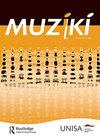Hegemonising Zimbabwe? The Polity of Mbare Chimurenga Lyrics in Perpetuating Mugabe’s and ZANU-PF’s Rule
IF 0.8
0 MUSIC
引用次数: 2
Abstract
ABSTRACT The role played by music as “popular culture” in political campaigning and in the perpetuation and sustenance of political hegemonies is a very significant one. Music and its accompaniment of dance is a common and popular channel through which political hegemonies are (re)constructed, (re)negotiated and perpetuated. In Zimbabwe the two largest political parties (ZANU-PF and MDC-T) both “own” musical ensembles who have been constantly and consistently producing political party specific lyrics as part of the utilisation of music as popular culture in the broader political discourse of electioneering and election campaigning. Musical lyrics exude attempts at the (re)construction and (re)negotiation of political meaning and reality and by extension the (re)negotiation and (re)configuration of power relations and dynamics. Selected lyrics from the ZANU-PF musical ensemble, Mbare Chimurenga Choir, are examined through the discourse linguistic theory of Appraisal. This is done by examining how the proliferation of linguistic resources that espouse politically and ideologically embedded positive attitudinal resources exhibit a perpetuation of Robert Mugabe’s rule, legacy and hegemony and by extension, that of ZANU-PF. While the analysis is largely couched within Appraisal Theory, the study also draws insights from Gramscian hegemony studies as well as Critical Discourse Analysis (CDA). The study observes and discusses, as the context for analysis of the discourse linguistic structure of the lyrics, the political environment prevailing in Zimbabwe during the period in which analysed songs were produced. Language (the lyrics), is in this regard perceived of as a superstructural semiotic tool through which hegemonies are (re)constructed, (re)negotiated and sustained.津巴布韦霸权?Mbare Chimurenga的政治歌词在延续穆加贝和非洲民族联盟-爱国阵线的统治
摘要音乐作为“流行文化”在政治竞选活动中,在政治霸权的延续和维系中所扮演的角色是非常重要的。音乐及其舞蹈伴奏是政治霸权得以重建、谈判和延续的常见和流行的渠道。在津巴布韦,两个最大的政党(ZANU-PF和MDC-T)都“拥有”音乐团,他们一直在不断地、持续地制作特定于政党的歌词,作为在竞选和竞选等更广泛的政治话语中利用音乐作为流行文化的一部分。歌词中流露出对政治意义和现实的(重新)构建和(重新)协商的尝试,并进而对权力关系和动态的(再次)协商和(再次)配置进行了尝试。从ZANU-PF音乐合奏团姆巴雷·奇穆伦加合唱团中选出的歌词,通过话语语言学的评价理论进行了检验。这是通过研究支持政治和意识形态嵌入的积极态度资源的语言资源的扩散如何表现出罗伯特·穆加贝的统治、遗产和霸权的永久性,进而表现出非洲民族联盟-爱国阵线的统治、遗留和霸权。虽然这一分析主要体现在评价理论中,但本研究也借鉴了葛兰西霸权研究和批判性话语分析(CDA)。作为分析歌词话语语言结构的背景,本研究观察并讨论了津巴布韦在分析歌曲产生期间的政治环境。在这方面,语言(歌词)被视为一种超结构符号学工具,霸权通过它被(重新)构建、(重新)协商和维持。
本文章由计算机程序翻译,如有差异,请以英文原文为准。
求助全文
约1分钟内获得全文
求助全文

 求助内容:
求助内容: 应助结果提醒方式:
应助结果提醒方式:


